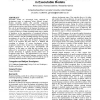Free Online Productivity Tools
i2Speak
i2Symbol
i2OCR
iTex2Img
iWeb2Print
iWeb2Shot
i2Type
iPdf2Split
iPdf2Merge
i2Bopomofo
i2Arabic
i2Style
i2Image
i2PDF
iLatex2Rtf
Sci2ools
106
click to vote
SIGSOFT
2008
ACM
2008
ACM
Improving robustness of evolving exceptional behaviour in executable models
Executable models are increasingly being employed by development teams to implement robust software systems. Modern executable models offer powerful composition mechanisms that allow developers to deliver a running system in small increments and in a time-effective fashion. Such models act e by providing high-level development abstractions and, as a consequence, it is expected that increased software robustness is achieved. However, existing executable models have a number of limitations on the representation of exceptional behaviour. Similarly to exception handling in programming languages, one of the key problems is that the modelling languages and supporting environments do not allow the explicit specification of global exception flows. They require that developers understand the source of an exception, the place where it is handled, and everything in between. As system development evolves, exceptional control flows become less well-understood, with negative consequences for the pr...
Exception Control Flow | Exception Handling Model | Global Exception | SIGSOFT 2008 | Software Engineering |
| Added | 20 Nov 2009 |
| Updated | 20 Nov 2009 |
| Type | Conference |
| Year | 2008 |
| Where | SIGSOFT |
| Authors | Alessandro Garcia, Nélio Cacho, Thomas Cottenier |
Comments (0)

